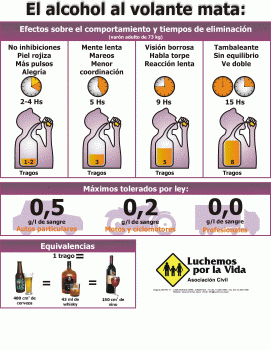Drinking and driving
Don’t drink alcohol if you are going to drive. Don’t consume alcohol at all neither before nor during the journey. Besides, it is advisable not to eat heavy food. Moreover, take into account that many prescribed medicines and illegal drugs can affect your ability of driving strongly.
No alcohol when driving.
Alcohol is a depressor of the nervous system. Although you don’t notice it, just one glass of wine, beer, whisky, etc., reduces your ability to drive because:
-
It dulls your senses, alters the perception and reduces the attention capacity.
- Reaction times are longer, so that the responses and manoeuvres become slower and clumsy.
- The vision is altered: especially, peripheral vision (vision at both sides) gets worse, the adaptation to the changes of light becomes slower (for example, in the cases of glare), and red tones are perceived with difficulty (it takes more time to the person to recognize red lights, position lamps and brake lights).
- Alcohol produces a false sensation of safety, with mistakes in the judgement and interpretation, which brings about speeding and every kind of infringements of traffic safety rules.
Take into account that:
- Neither the coffee nor other stimulants nullify its harmful effects, although it seems like they do so.
- Although you feel you are alert and try not to make mistakes, your family and you are in high risk because your brain is under the effects of alcohol.
- It is not necessary to be drunk to experience the effects of alcohol when you are driving.
- Alcohol is present in, at least, one out of two fatalities in traffic accidents all around the world.
Legal limit
National Traffic Law and its regulation establish a maximum limit of tolerance of BAC of 0,5 grams per litre, and National Law of Fight against Alcoholism Nº24,788, modifies it partially when it establishes new limits of 0,2 grames per litre of blood for motorcyclists and moped riders and 0 grams for professional drivers (transportation of travellers, kids or freight transport).
What does a maximum of 0,5 mean? According to this limit, how much alcohol is tolerated by each person?
This is not a quantitative limit that is the same for everybody. In fact, it varies for each person, according to different personal circumstances and, especially, according to the weight and sex. Some other factors, such as sleepiness, consumption of certain medicines, illnesses and so on, can also reinforce its toxic effects. For this reason, in fact, it is very difficult to say exactly if a glass of an alcoholic drink in a certain person and in a certain moment will make him/her exceed or not the legally tolerated limit, highlighting, besides, that not to exceed this limit doesn’t ensure that a person is in good conditions to drive in a safe way, since, even under the legal limit, the psycho-physical capacity gets affected.


